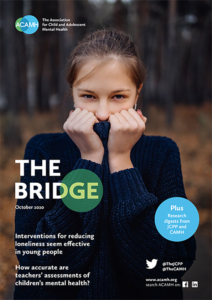Welcome to the October 2020 issue of The Bridge, click on the front cover to download the issue as a pdf or read the individual October 2020 articles online.
Welcome to the October 2020 issue of The Bridge. Here in the UK, October is Black History Month, a time for celebration of the achievements and contributions of Black people to British society, as well as continued learning about Black history. I hope that you will be able to join local events celebrating the outstanding work of Black mental health professionals, as well as national events, such as the inaugural meeting of the Association of Black Psychiatrists in the UK. (1)
Black History Month is particularly poignant this year, following the unprecedented global protests against racism in the wake of the brutal killing of George Floyd, and the disproportionately high COVID-19 morbidity and mortality in BAME people. Since these events there’s been an increased focus on racial inequality in many aspects of life, including our field of mental health, highlighting stark injustices. (2) For example, because of racism and multiple socioeconomic disadvantages, Black people are more likely to develop mental health disorders, but half as likely to get treatment for these conditions, and four times as likely to be detained under the Mental Health Act for acute crises, compared to white people. (3, 4) There have been many calls and suggestions for action to address these inequalities at societal, institutional, and individual levels. (5,6) Research has a crucial role in this process because research evidence influences clinical knowledge, practice, and policy.
Yet bias is also seen in research, with the overwhelming majority of academic leaders and published study participants being white North Americans or Europeans. Therefore, it is crucial to test whether findings from these studies generalise to BAME people in these areas, as well as undertaking more research in other parts of the world, led by scientists from these communities. For example, in this issue of The Bridge we discuss research by Quanfa He and James Li who investigated whether the structure of psychopathology differs by racial-ethnic background in American young people.
Additionally, we discuss research by Tochukwu Nweze and colleagues who studied working memory in Nigerian young people not living with their parents. In future, it’s vital that research continues to diversify and improve representation, which is essential to reduce bias in mental health care. (7-9)
In addition to these important studies, this issue of The Bridge also brings you a thought-provoking discussion about developments in eating disorders research by Dr. Dasha Nicholls, as well as several other interesting articles about the latest research in child and adolescent mental health. I hope you enjoy reading this issue of The Bridge.
References
1. Fapohunda M (2020) Reflecting on Black Lives Matter and celebrating the new Association of Black Psychiatrists. RCPsych: https://www.rcpsych.ac.uk/news-and-features/blogs/detail/black-history-month/2020/10/01/reflecting-on-black-lives-matter-and-celebrating-the-new-association-of-black-psychiatrists
2. Farquharson WH, Thornton CJ (2020) Debate: Exposing the most serious infirmity–racism’s impact on health in the era of COVID‐19. Child Adolesc Ment Health; 10.1111/camh.12407
3. McManus S, Bebbington P, Jenkins R, Brugha T (eds.) (2016) Mental health and wellbeing in England: Adult Psychiatric Morbidity Survey 2014. NHS Digital: https://digital.nhs.uk/data-and-information/publications/statistical/adult-psychiatric-morbidity-survey/adult-psychiatric-morbidity-survey-survey-of-mental-health-and-wellbeing-england-2014
4. Community and Mental Health Analysis Team, NHS Digital (2019) Mental Health Act Statistics, Annual Figures: 2018-19. NHS Digital: https://digital.nhs.uk/data-and-information/publications/statistical/mental-health-act-statistics-annual-figures/2018-19-annual-figures
5. Smith L (2020) Let’s address systemic racism. RCPsych: https://www.rcpsych.ac.uk/news-and-features/blogs/detail/chief-executives-blog/2020/07/05/let%27s-address-systemic-racism
6. Cénat JM (2020) How to provide anti-racist mental health care. Lancet Psychiatry; S2215-0366(20)30309-6
7. The Lancet (2020) Medicine and medical science: Black lives must matter more. Lancet; 395(10240):1813
8. Thorp HH (2020) Time to look in the mirror. Science; 368(6494):1161
9. The Cell Editorial Team (2020) Science Has a Racism Problem. Cell; 181:1443-1444
Articles from the October 2020 edition
Developments in Eating Disorders Research by Dasha Nicholls
Gender identity is not as simple as ABC(D)
Do sex differences affect ASD symptom severity scores?
PCIT-ED seems to improve parenting behaviour and affect towards children with depression
Interventions for reducing loneliness seem effective in young people
Is brain circuitry linked with early symptoms of autism spectrum disorder?
Young people’s ‘neural fingerprints’ might permit a precision-medicine approach to depression
How accurate are teachers’ assessments of children’s mental health?
Is race linked to the structure of psychopathology in young people?
Online self-harm content might provide peer support to young people
What mechanisms underlie reduced social attention in people with ASD?
Nigerian young people from parentally deprived backgrounds show enhanced working memory capacity
